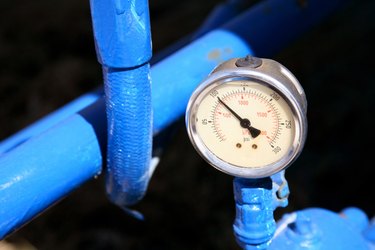
A manometer is an instrument for measuring pressure. Plumbers use it to check the pressure in pipes, as low pressure may indicate an undesirable leak. At its most simple a manometer consists of a U-shape tube filled with water or mercury. The pressure in the pipe to which the manometer is connected causes the fluid to move in the tube. The distance moved is proportional to the pressure. For safety reasons, the poisonous mercury is replaced by a much safer digital sensor and a silicone rubber "connector tube" in modern manometers.
Step 1
Locate the test point on the pipe, or a value that opens to the atmosphere, such as a gas burner or a tap. Test points vary in size and shape but usually consist of a plugged section of pipe extending from the main pipe. For example, the test point on a refrigerator gas pipe may be a plugged 1/8-inch pipe.
Video of the Day
Step 2
Remove the plug from the end of the test point, if relevant, then push the rubber cone on the end of the manometer tube, over the end of the value or test point on the pipe. Connection methods vary so consult the manufacturer's manual before use.
Step 3
Ensure that the manometer is securely sealed to the pipe. Turn on the tap, if present, to complete the connection between the manometer and the pipe. Remain with the manometer and observe the reading on the dial or display. This shows the pressure in the pipe.
Step 4
Close the tap, if opened, and then remove the manometer from the pipe. Replace the plug in the end of the test pipe and make certain it is secure.
Tip
Test points in pipes come in a variety of shapes and sizes, including those with inline taps and models with what looks like a bolt screwed into the end of a narrow pipe.
Take several reading to ascertain average results. Pressure is liable to vary throughout the day.
Replacing the manometer in its box protects it from damage and extends its lifespan.
Warning
Never leave an unattended manometer connected to a pipe. Most connections rely on a "push fit" system that can work loose without warning.
Manometers are precision instruments. Dropping them and exposing them to violent shocks may cause damage and reduce their accuracy.
Video of the Day